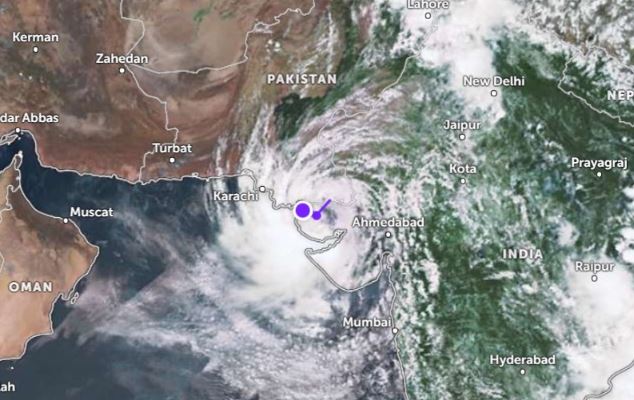Cyclone Asna has triggered severe weather in Pakistan and India, causing widespread devastation. Heavy rains and strong winds forced school closures and the evacuation of thousands in coastal towns on Saturday. Rain-related accidents have claimed the lives of 24 people — three in Indian Gujarat and 21 across Pakistan.
The Pakistan Meteorology Department (PMD) reported that Cyclone Asna, located over the northeast Arabian Sea near the Sindh coast, moved westward over the past 6 hours. It currently lies at approximately 120 km south of Karachi and 180 km southwest of Thatta. The cyclone is expected to move west-northwestwards and then west-southwestwards. If conditions remain favorable, it will enter the Arabian Sea by Saturday afternoon or evening, according to the latest PMD alert.
Cyclone Asna is expected to bring rain-thundershowers with strong winds of 60-70 km/hour, gusting up to 80 km/hour, in areas including Karachi, Badin, Thatta, Sujawal, Hyderabad, Tando Allahyar, Tando Mohammad Khan, Matiari, Jamshoro, and Dadu until August 31. The sea conditions are predicted to stay rough with squally winds. Fishermen have been warned to stay out of the sea until August 31.
Mehar Sahibzada Khan, Director General of PMD, stated that Cyclone Asna formed off the Karachi-Gwadar coast. “The cyclone may result in heavy rainfalls after hitting the western coastal areas. Unlike typical cyclones, Asna is advancing in reverse direction,” he explained. “It is expected to intensify into a hurricane, with more impacts visible next week,” he added. The upper parts of the country will experience more rain from September 2 to 4.
Karachi received 147mm (5.79 inches) of rain overnight. The Met Office forecasted more heavy rains in Karachi within the next 24 hours, with strong winds and thundershowers. Karachi’s Mayor, Murtaza Wahab, urged residents to avoid “unnecessary movement” amid these conditions.
In Balochistan, heavy rains have washed away roads and disrupted gas supplies in various districts. A gas pipeline was swept away by floodwaters in the Bolan River, leading to gas supply cuts in parts of Quetta, Pishin, Ziarat, Kalat, and Mastung. Landslides were reported in the Bolan area, blocking the N-65 highway, though traffic was restored later.
Flash floods in Loralai, Qila Saifullah, Duki, Harnai, and Jhal Magsi swept away 13 people, with seven rescued after hours of effort. One person remains missing in Jhal Magsi. Floodwaters in various rivers and streams pose a significant threat to settlements and crops. The PDMA-Balochistan has advised fishermen to avoid fishing for at least 48 hours.
In Lahore, 31mm of rainfall was recorded across different locations. In Faisalabad, two siblings died, and five others were injured in separate roof collapse incidents. In Bahawalpur, house collapses killed three people, and six died in Bahawalnagar due to rain-related incidents.
A landslide triggered by rain in Upper Dir’s Ramyal village killed 12 members of the same family. The Panjkora River flooded, prompting warnings for residents along its banks. Landslides also stranded tourists in Kumrat and Thandiani. The recent rain spells blocked several roads and disrupted traffic between Khyber Pakhtunkhwa and Gilgit-Baltistan.
Meanwhile, the monsoon rains continued in the districts of Mansehra, Torghar, Kolai-Palas, Lower Kohistan, and Upper Kohistan. Flash floods in Lower Chitral blocked access to Upper Chitral. According to PDMA-KPK, 68 people have died, and 117 were injured in rain-related incidents since the monsoon began.
In India, three more deaths were reported in Gujarat due to rain, raising the toll to 31 this week. Over 8,700 people were evacuated from ten districts. The cyclone’s impact is expected to lessen in Gujarat as it moves towards the sea, with wind speeds dropping to 40-50 kmph, officials said.
The effects of Cyclone Asna continue to be felt across both countries, with rescue operations ongoing and officials urging caution as the storm moves through the region.


